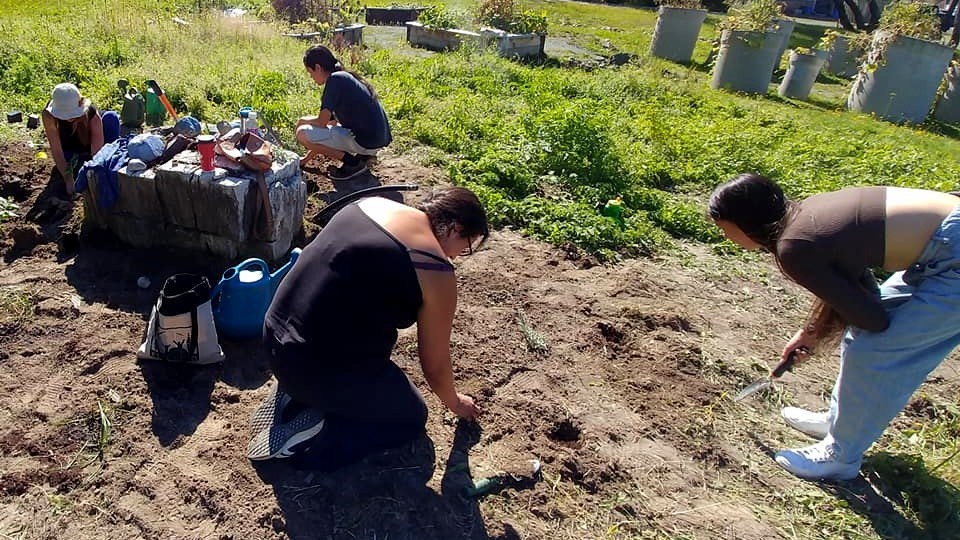Food can connect us all. With this idea in mind, matched with a need to teach people how to grow food in a northern climate, especially those who are new to the North, Global Gardens N’Swakamok/Sudbury emerged.
Inspired by on The Stop Community Food Centre’s Global Roots Garden in Toronto and sparked in 2020 by two newcomers to the city, Jimena Prado and Amr Elkhashab, an idea that has been floating around in Greater Sudbury for a few years to form a garden project finally took root.
Amr and Jimena moved to Sudbury for work in early 2020 and decided they wanted to connect to the local gardening community, seeking tips on how to grow food up here. Amr grew up connected to farming in Nigeria, and Jimena, Amr’s supportive partner who grew up in Mexico, also felt an interest to see what could grow in our relatively short growing season.
With N’Swakamok/Sudbury becoming more and more of an international city, we are seeing the emergence of cuisine and small grocery stores reflecting the food cultures of the diversifying population. Sudbury African Market, Bombay Spices and the hidden gem that is the Regent One Stop Convenient store are some of the small grocery stores to visit to see this reflection and buy some ingredients for your next meal.
A next step was to start growing the food that reflects Sudbury’s beautiful, diversifying community and 2021 saw a small group of folks from Turtle Island, Nepal, South Africa, Korea, Brazil, and India come together to do just that in existing urban food production spaces. With support and guidance from the co-ordinators of the Indigenous-led program at Better Beginnings Better Futures, The Flour Mill Community Farm, Sudbury’s first urban community farm established in 2017, dedicated several beds to the Global Gardens initiative, and the Delki Dozzi Community Garden generously provided their beloved “crop circle” space to the project.
Collège Boréal donated greenhouse space to allow the group to start several types of crops, including peppers, tomatillos, ground cherries, amaranth, okra and spices such as methi (fenugreek), epazote, Korean water parsley, shiso, lemongrass, hibiscus and cumin.
Turtle mounds growing the Three Sisters — squash, corn, and beans — were planted, as were spirit gardens with semaa (tobacco), mashkodewashk (sage), wiingashk (sweetgrass), and giizhik (cedar). Not everything survived, but that was more related to drought and human error than due to having too short a growing season.
The group is confident that 2022 will be an even greater success with what they have learned together this year.
To emphasize the creation of safer spaces for diverse populations, while also coming together to decolonize our relationship to each other and the land, the group has formed a series of community agreements and expectations to help guide and support how the group runs.
Adapted from other organizations rooted in anti-oppression and anti-racism, Global Gardens has added agreements that suit the group in the here and now. These are living agreements that will evolve as the group does, meeting needs as they arise as best as possible.
If the following agreements resonate with you, and you would like to join or learn more about Global Gardens N’Swakamok/Sudbury, please email globalgardenssudbury@gmail.com, or find the group on Instagram and Facebook.
Community Agreements/ Expectations:
Centre our shared learning. We honour that we share a unique learning space during a transformative time. Let’s remember that our purpose is to learn together, which means we must be aware of one another, meet one another, and support one another toward learning.
From us there are many. We are holding many needs, many options, and many solutions. Let’s contribute to our own needs, and as you’re able, contribute toward the collective. We hold this space together. What we pay attention to grows. This reminds us that where our focus and energy is directed is where our learning will be. We have opportunities to learn how to decolonize urban agriculture spaces & community gardens, and to create new meanings, understandings, and traditions. Let’s resist, exist, and build!
Make space, fully engage. Make space for others if you often take more space. Take space if you often don’t. We have enough space. Fully engage by being aware of your space.
Don’t assume, ask. Try your best to avoid assumptions. Please ask instead.
Impact matters. Appreciate that the impact of our choices and behaviors are the lived experiences of others.
We are accountable to work in the spirit of the processes of reconciliation and decolonization and to explore what this means to each of us.
We use people’s pronouns (ex. she/her/he/him/they/them, or any other preferred pronouns). All of our experiences, ideas, and intelligences are valuable and welcome.
We remember that our lived experiences are different and acknowledge that we have different experiences from others. Allow others to speak to their experience. We speak from “I” and clarify “we.”
We honour stories. When we hear a story, we are being trusted to hold it, not to share it unless we have explicitly been given permission. We do not demand knowledge from others or answers to our questions, but enter into relations and confirm that someone is the person to ask and is comfortable answering. We respect their “no.”
We acknowledge our mistakes and take steps to make it right, we make room for others to acknowledge and express themselves if we have hurt or affected them with our actions or words. If you don’t understand your mistake, ask for appropriate support.
Fionna Tough is a graduate of Fleming College’s Sustainable Agriculture Program and has been farming in the N’Swakamok/Sudbury region of Atikameksheng Territory since 2013.
